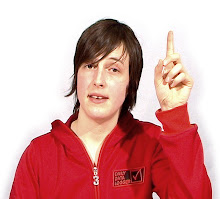Waiting For Laptop
Today was the first day of the recording process. I found the whole experience bewildering and intensely stressful. I have described these feelings in more detail in The Recording Process entry (published below).
For a while it crossed my mind that the only way I could get through the day, would be to lie on my bed and do absolutely nothing, therefore not having to write anything down. Instead I decided to sit at my desk and spend several hours writing about my experience of Prime to date, how my ideas about 'work' have developed in the run up to finding a job. This text can be read in the earlier entries published below on this blog (which were all written during this period on Monday 26 June).
For five weeks running up to today, I had been without my laptop as it had been sent back to the manufacturers Evesham for repair. I had been told the previous week that the laptop would be returned this Monday. For five weeks I had worked on an old PC in the studio and I was greatly looking forward to getting my laptop back.
At 11:55 I called Evesham only to discover that my laptop was not scheduled to be delivered today, but would in fact arrive on Tuesday. This frustrated me a great deal as I had transferred all my files from the computer in the studio to my hard drive and was no longer able to use it in anticipation of the laptop's return.
Later that day I began to think carefully about exactly what information I should collect in my Log Book. When I started recording, I had not properly planned how much detail I would or should go into. I began to work on the first sketches on what the Timelines, I hoped to make with the information, might look like and slowly I began to rationalise just how much information it would physically be possible to convey on paper.
I worked out that even if the Timelines were each a meter long (totalling 28 meters), activities of one minute would be the smallest visible duration. It was then that I decided that activities of less than one minute would not be recorded. Moving from room to another within a building would not be recorded (unless the activity changed at the same time) and conversations with people would not be record unless they indicated a change of activity (from work to leisure for example) except for those taking place on the phone.
In the early evening I watched Italy beat Australia on a last minute penalty. This was an exciting moment in what had been a miserable day.





